Operations and Project Management: Unilever Case Study Analysis
VerifiedAdded on 2023/06/12
|16
|5297
|189
Report
AI Summary
This report provides a comprehensive review and critique of operations management principles within Unilever, a multinational consumer goods company. It begins by introducing Unilever and differentiating between operation and operations management, emphasizing resource utilization and strategic business challenges. The report then assesses the implementation of operations management principles such as reality, organization, fundamentals, accountability, causality, managed passion, and humility within Unilever. It analyzes how Unilever's operations management meets organizational requirements, focusing on improving product quality, customer satisfaction, revenue increase, competitive advantage, and compliance. Furthermore, the report discusses continuous improvement as a philosophy, detailing Lean principles like defining value, mapping the value stream, creating flow, establishing pull, and pursuing perfection. The report concludes with a continuous improvement plan, offering justified recommendations based on the critique of Unilever's operations management principles, highlighting the importance of waste reduction and customer-centric strategies. Desklib provides access to similar solved assignments and past papers for students.
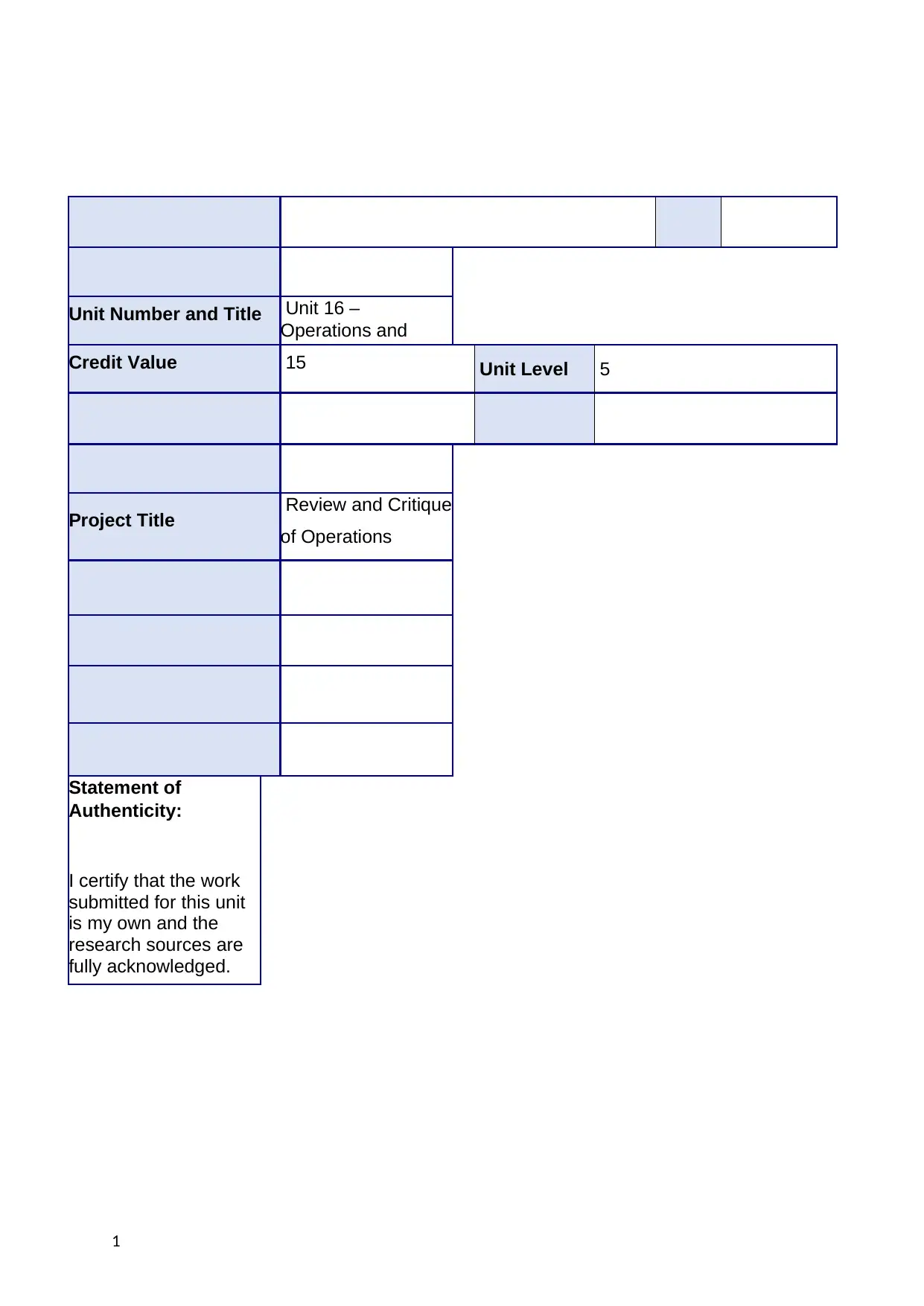
Unit Number and Title Unit 16 –
Operations and
Project ManagementCredit Value 15 Unit Level 5
Project Title Review and Critique
of Operations
Management (Part
Statement of
Authenticity:
I certify that the work
submitted for this unit
is my own and the
research sources are
fully acknowledged.
1
Operations and
Project ManagementCredit Value 15 Unit Level 5
Project Title Review and Critique
of Operations
Management (Part
Statement of
Authenticity:
I certify that the work
submitted for this unit
is my own and the
research sources are
fully acknowledged.
1
Paraphrase This Document
Need a fresh take? Get an instant paraphrase of this document with our AI Paraphraser
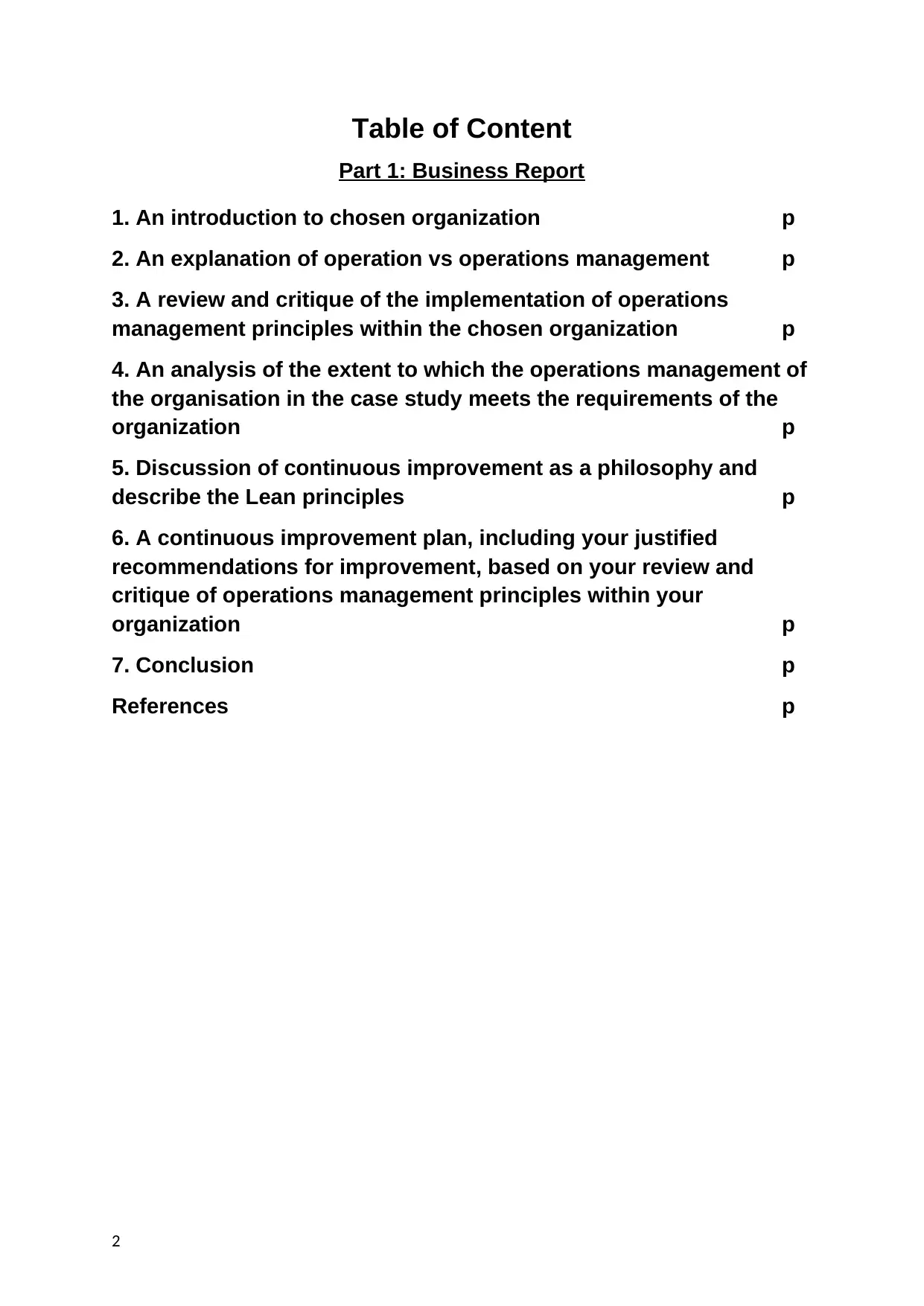
Table of Content
Part 1: Business Report
1. An introduction to chosen organization p
2. An explanation of operation vs operations management p
3. A review and critique of the implementation of operations
management principles within the chosen organization p
4. An analysis of the extent to which the operations management of
the organisation in the case study meets the requirements of the
organization p
5. Discussion of continuous improvement as a philosophy and
describe the Lean principles p
6. A continuous improvement plan, including your justified
recommendations for improvement, based on your review and
critique of operations management principles within your
organization p
7. Conclusion p
References p
2
Part 1: Business Report
1. An introduction to chosen organization p
2. An explanation of operation vs operations management p
3. A review and critique of the implementation of operations
management principles within the chosen organization p
4. An analysis of the extent to which the operations management of
the organisation in the case study meets the requirements of the
organization p
5. Discussion of continuous improvement as a philosophy and
describe the Lean principles p
6. A continuous improvement plan, including your justified
recommendations for improvement, based on your review and
critique of operations management principles within your
organization p
7. Conclusion p
References p
2
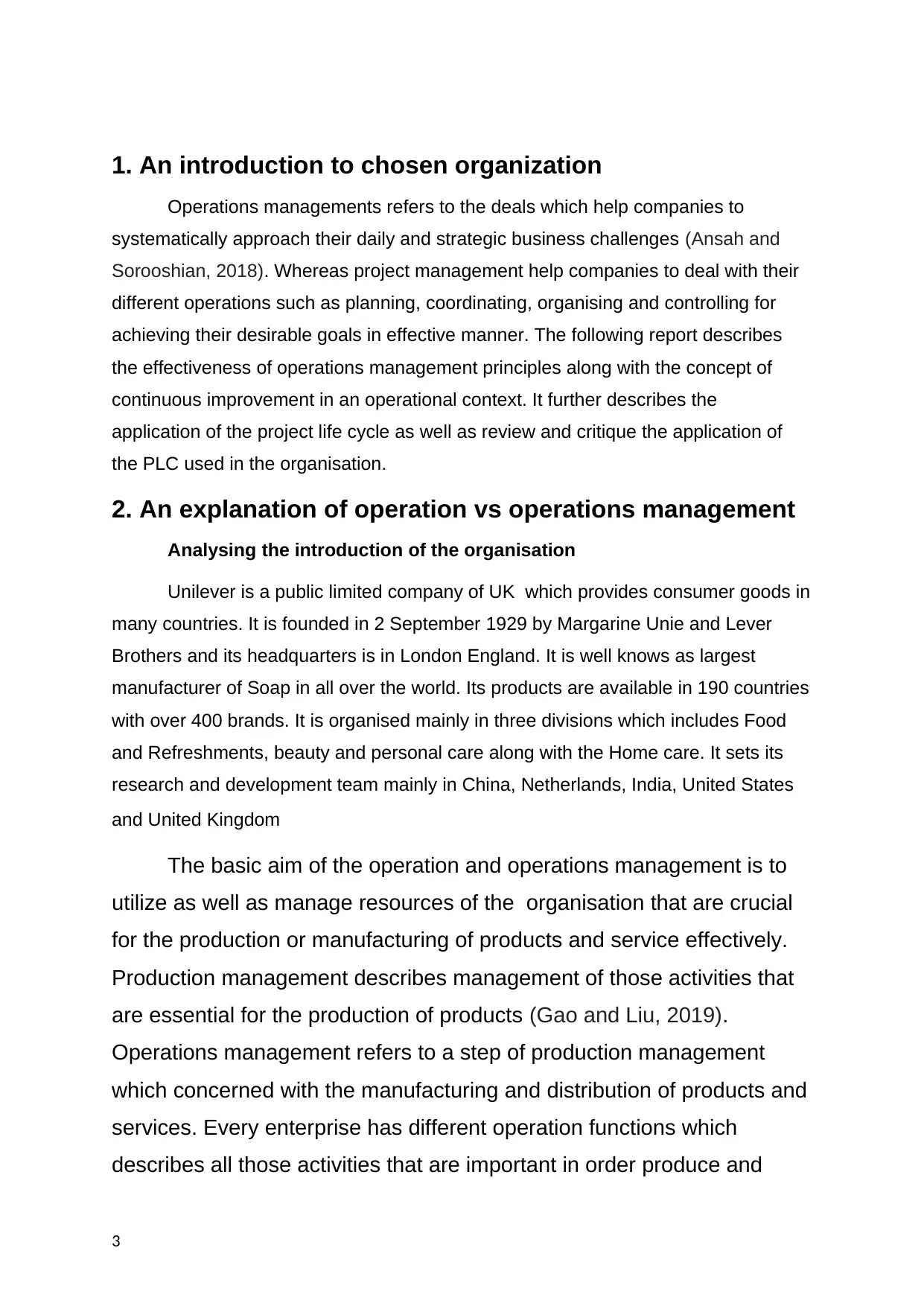
1. An introduction to chosen organization
Operations managements refers to the deals which help companies to
systematically approach their daily and strategic business challenges (Ansah and
Sorooshian, 2018). Whereas project management help companies to deal with their
different operations such as planning, coordinating, organising and controlling for
achieving their desirable goals in effective manner. The following report describes
the effectiveness of operations management principles along with the concept of
continuous improvement in an operational context. It further describes the
application of the project life cycle as well as review and critique the application of
the PLC used in the organisation.
2. An explanation of operation vs operations management
Analysing the introduction of the organisation
Unilever is a public limited company of UK which provides consumer goods in
many countries. It is founded in 2 September 1929 by Margarine Unie and Lever
Brothers and its headquarters is in London England. It is well knows as largest
manufacturer of Soap in all over the world. Its products are available in 190 countries
with over 400 brands. It is organised mainly in three divisions which includes Food
and Refreshments, beauty and personal care along with the Home care. It sets its
research and development team mainly in China, Netherlands, India, United States
and United Kingdom
The basic aim of the operation and operations management is to
utilize as well as manage resources of the organisation that are crucial
for the production or manufacturing of products and service effectively.
Production management describes management of those activities that
are essential for the production of products (Gao and Liu, 2019).
Operations management refers to a step of production management
which concerned with the manufacturing and distribution of products and
services. Every enterprise has different operation functions which
describes all those activities that are important in order produce and
3
Operations managements refers to the deals which help companies to
systematically approach their daily and strategic business challenges (Ansah and
Sorooshian, 2018). Whereas project management help companies to deal with their
different operations such as planning, coordinating, organising and controlling for
achieving their desirable goals in effective manner. The following report describes
the effectiveness of operations management principles along with the concept of
continuous improvement in an operational context. It further describes the
application of the project life cycle as well as review and critique the application of
the PLC used in the organisation.
2. An explanation of operation vs operations management
Analysing the introduction of the organisation
Unilever is a public limited company of UK which provides consumer goods in
many countries. It is founded in 2 September 1929 by Margarine Unie and Lever
Brothers and its headquarters is in London England. It is well knows as largest
manufacturer of Soap in all over the world. Its products are available in 190 countries
with over 400 brands. It is organised mainly in three divisions which includes Food
and Refreshments, beauty and personal care along with the Home care. It sets its
research and development team mainly in China, Netherlands, India, United States
and United Kingdom
The basic aim of the operation and operations management is to
utilize as well as manage resources of the organisation that are crucial
for the production or manufacturing of products and service effectively.
Production management describes management of those activities that
are essential for the production of products (Gao and Liu, 2019).
Operations management refers to a step of production management
which concerned with the manufacturing and distribution of products and
services. Every enterprise has different operation functions which
describes all those activities that are important in order produce and
3
⊘ This is a preview!⊘
Do you want full access?
Subscribe today to unlock all pages.

Trusted by 1+ million students worldwide
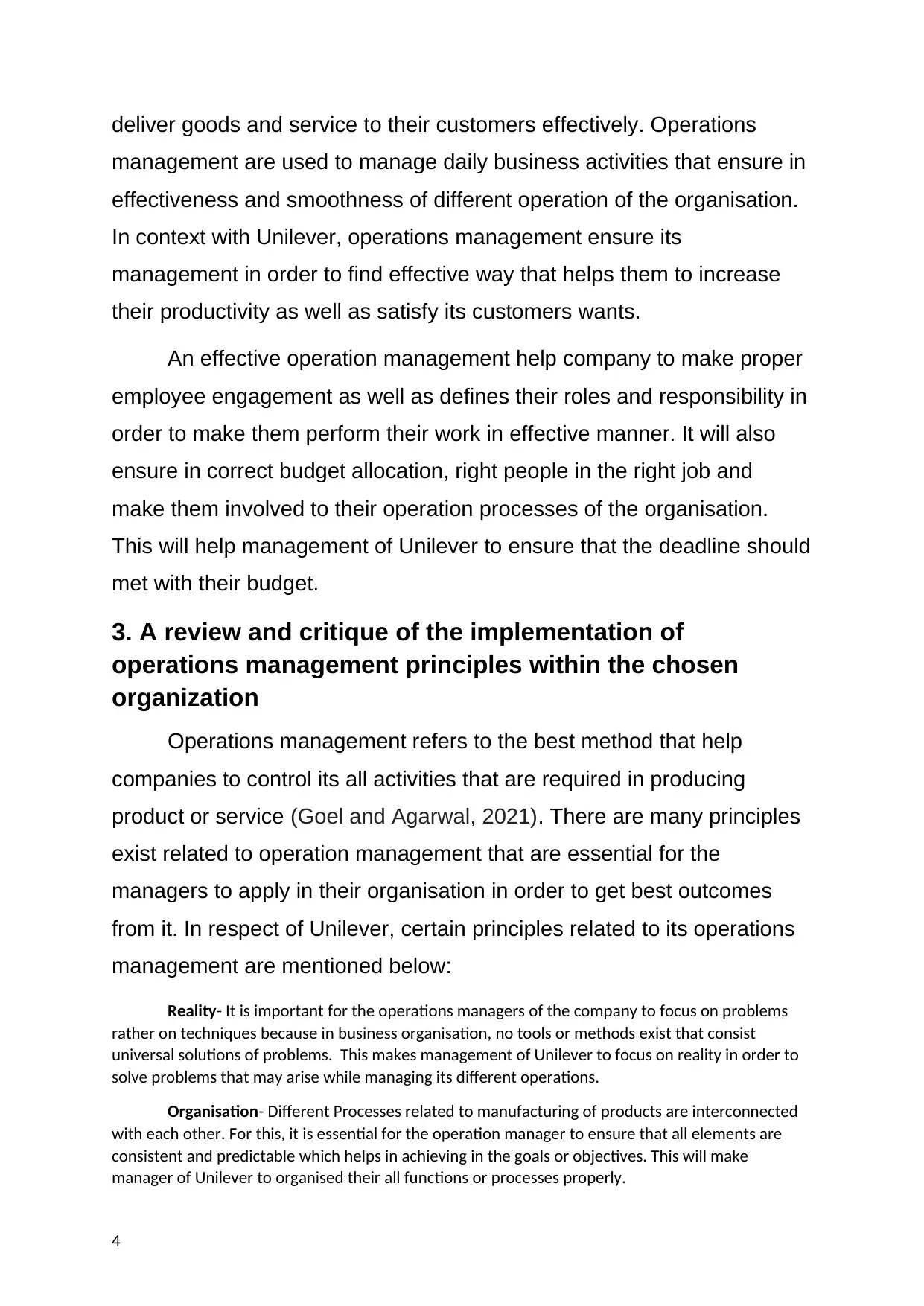
deliver goods and service to their customers effectively. Operations
management are used to manage daily business activities that ensure in
effectiveness and smoothness of different operation of the organisation.
In context with Unilever, operations management ensure its
management in order to find effective way that helps them to increase
their productivity as well as satisfy its customers wants.
An effective operation management help company to make proper
employee engagement as well as defines their roles and responsibility in
order to make them perform their work in effective manner. It will also
ensure in correct budget allocation, right people in the right job and
make them involved to their operation processes of the organisation.
This will help management of Unilever to ensure that the deadline should
met with their budget.
3. A review and critique of the implementation of
operations management principles within the chosen
organization
Operations management refers to the best method that help
companies to control its all activities that are required in producing
product or service (Goel and Agarwal, 2021). There are many principles
exist related to operation management that are essential for the
managers to apply in their organisation in order to get best outcomes
from it. In respect of Unilever, certain principles related to its operations
management are mentioned below:
Reality- It is important for the operations managers of the company to focus on problems
rather on techniques because in business organisation, no tools or methods exist that consist
universal solutions of problems. This makes management of Unilever to focus on reality in order to
solve problems that may arise while managing its different operations.
Organisation- Different Processes related to manufacturing of products are interconnected
with each other. For this, it is essential for the operation manager to ensure that all elements are
consistent and predictable which helps in achieving in the goals or objectives. This will make
manager of Unilever to organised their all functions or processes properly.
4
management are used to manage daily business activities that ensure in
effectiveness and smoothness of different operation of the organisation.
In context with Unilever, operations management ensure its
management in order to find effective way that helps them to increase
their productivity as well as satisfy its customers wants.
An effective operation management help company to make proper
employee engagement as well as defines their roles and responsibility in
order to make them perform their work in effective manner. It will also
ensure in correct budget allocation, right people in the right job and
make them involved to their operation processes of the organisation.
This will help management of Unilever to ensure that the deadline should
met with their budget.
3. A review and critique of the implementation of
operations management principles within the chosen
organization
Operations management refers to the best method that help
companies to control its all activities that are required in producing
product or service (Goel and Agarwal, 2021). There are many principles
exist related to operation management that are essential for the
managers to apply in their organisation in order to get best outcomes
from it. In respect of Unilever, certain principles related to its operations
management are mentioned below:
Reality- It is important for the operations managers of the company to focus on problems
rather on techniques because in business organisation, no tools or methods exist that consist
universal solutions of problems. This makes management of Unilever to focus on reality in order to
solve problems that may arise while managing its different operations.
Organisation- Different Processes related to manufacturing of products are interconnected
with each other. For this, it is essential for the operation manager to ensure that all elements are
consistent and predictable which helps in achieving in the goals or objectives. This will make
manager of Unilever to organised their all functions or processes properly.
4
Paraphrase This Document
Need a fresh take? Get an instant paraphrase of this document with our AI Paraphraser
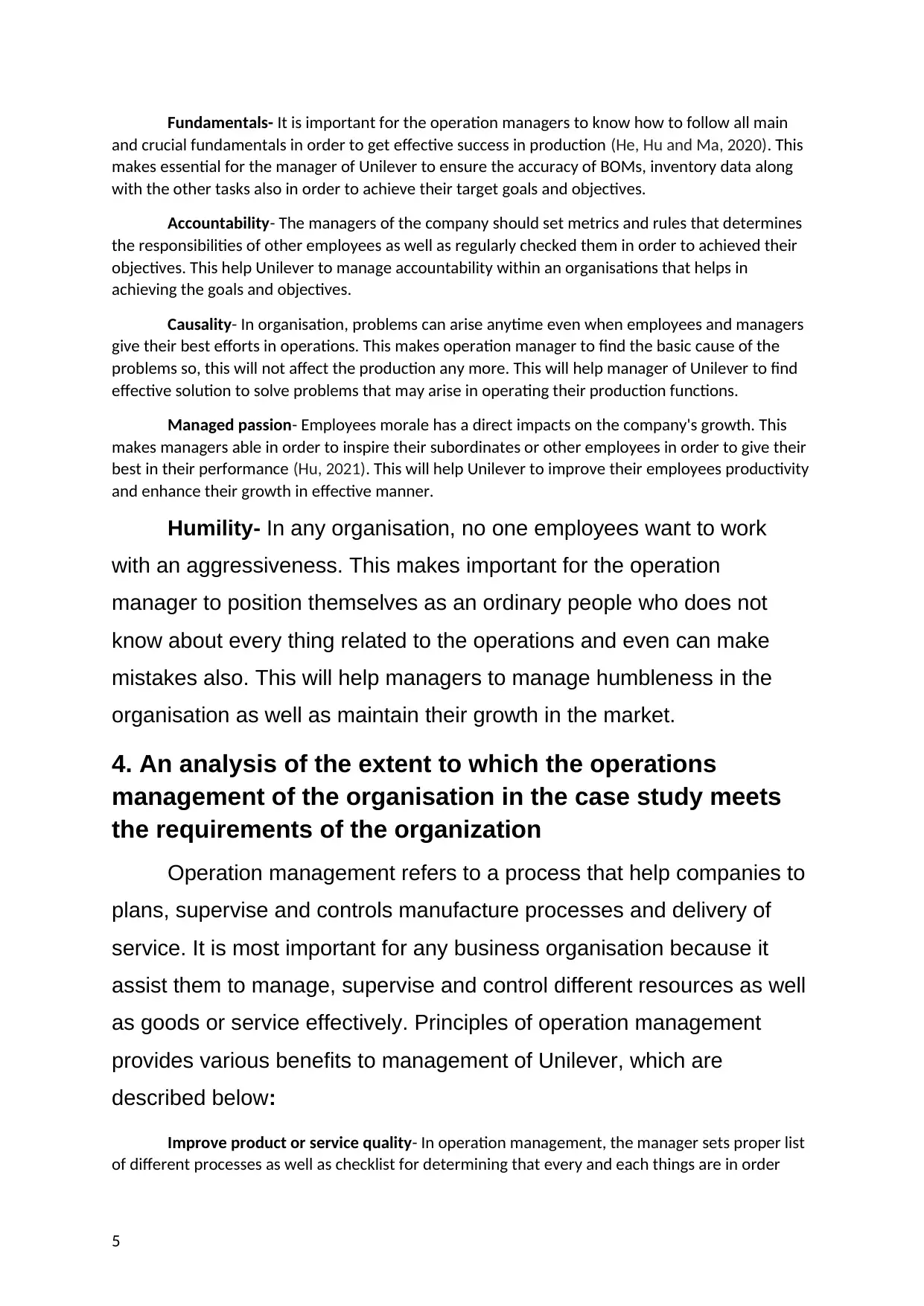
Fundamentals- It is important for the operation managers to know how to follow all main
and crucial fundamentals in order to get effective success in production (He, Hu and Ma, 2020). This
makes essential for the manager of Unilever to ensure the accuracy of BOMs, inventory data along
with the other tasks also in order to achieve their target goals and objectives.
Accountability- The managers of the company should set metrics and rules that determines
the responsibilities of other employees as well as regularly checked them in order to achieved their
objectives. This help Unilever to manage accountability within an organisations that helps in
achieving the goals and objectives.
Causality- In organisation, problems can arise anytime even when employees and managers
give their best efforts in operations. This makes operation manager to find the basic cause of the
problems so, this will not affect the production any more. This will help manager of Unilever to find
effective solution to solve problems that may arise in operating their production functions.
Managed passion- Employees morale has a direct impacts on the company's growth. This
makes managers able in order to inspire their subordinates or other employees in order to give their
best in their performance (Hu, 2021). This will help Unilever to improve their employees productivity
and enhance their growth in effective manner.
Humility- In any organisation, no one employees want to work
with an aggressiveness. This makes important for the operation
manager to position themselves as an ordinary people who does not
know about every thing related to the operations and even can make
mistakes also. This will help managers to manage humbleness in the
organisation as well as maintain their growth in the market.
4. An analysis of the extent to which the operations
management of the organisation in the case study meets
the requirements of the organization
Operation management refers to a process that help companies to
plans, supervise and controls manufacture processes and delivery of
service. It is most important for any business organisation because it
assist them to manage, supervise and control different resources as well
as goods or service effectively. Principles of operation management
provides various benefits to management of Unilever, which are
described below:
Improve product or service quality- In operation management, the manager sets proper list
of different processes as well as checklist for determining that every and each things are in order
5
and crucial fundamentals in order to get effective success in production (He, Hu and Ma, 2020). This
makes essential for the manager of Unilever to ensure the accuracy of BOMs, inventory data along
with the other tasks also in order to achieve their target goals and objectives.
Accountability- The managers of the company should set metrics and rules that determines
the responsibilities of other employees as well as regularly checked them in order to achieved their
objectives. This help Unilever to manage accountability within an organisations that helps in
achieving the goals and objectives.
Causality- In organisation, problems can arise anytime even when employees and managers
give their best efforts in operations. This makes operation manager to find the basic cause of the
problems so, this will not affect the production any more. This will help manager of Unilever to find
effective solution to solve problems that may arise in operating their production functions.
Managed passion- Employees morale has a direct impacts on the company's growth. This
makes managers able in order to inspire their subordinates or other employees in order to give their
best in their performance (Hu, 2021). This will help Unilever to improve their employees productivity
and enhance their growth in effective manner.
Humility- In any organisation, no one employees want to work
with an aggressiveness. This makes important for the operation
manager to position themselves as an ordinary people who does not
know about every thing related to the operations and even can make
mistakes also. This will help managers to manage humbleness in the
organisation as well as maintain their growth in the market.
4. An analysis of the extent to which the operations
management of the organisation in the case study meets
the requirements of the organization
Operation management refers to a process that help companies to
plans, supervise and controls manufacture processes and delivery of
service. It is most important for any business organisation because it
assist them to manage, supervise and control different resources as well
as goods or service effectively. Principles of operation management
provides various benefits to management of Unilever, which are
described below:
Improve product or service quality- In operation management, the manager sets proper list
of different processes as well as checklist for determining that every and each things are in order
5
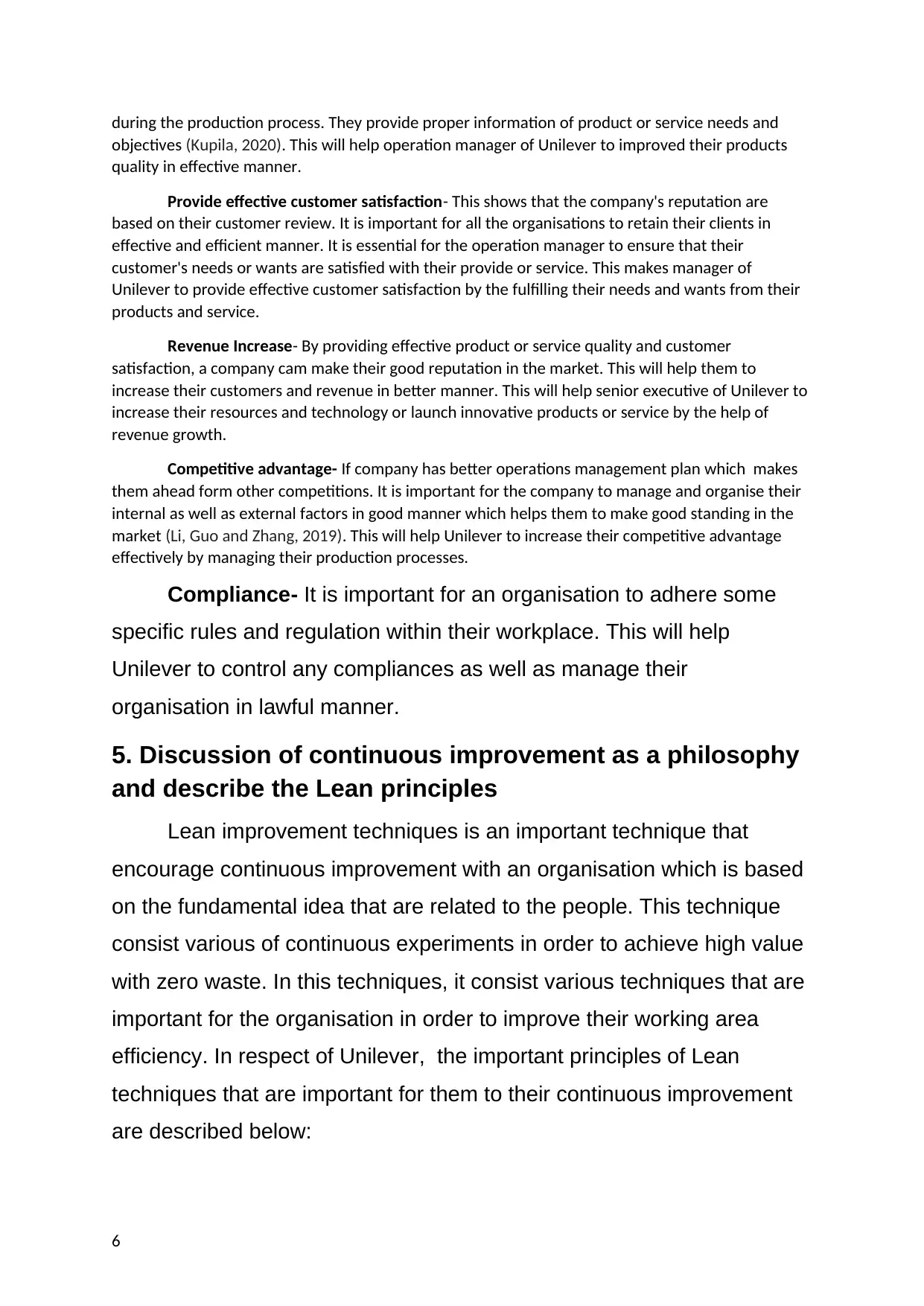
during the production process. They provide proper information of product or service needs and
objectives (Kupila, 2020). This will help operation manager of Unilever to improved their products
quality in effective manner.
Provide effective customer satisfaction- This shows that the company's reputation are
based on their customer review. It is important for all the organisations to retain their clients in
effective and efficient manner. It is essential for the operation manager to ensure that their
customer's needs or wants are satisfied with their provide or service. This makes manager of
Unilever to provide effective customer satisfaction by the fulfilling their needs and wants from their
products and service.
Revenue Increase- By providing effective product or service quality and customer
satisfaction, a company cam make their good reputation in the market. This will help them to
increase their customers and revenue in better manner. This will help senior executive of Unilever to
increase their resources and technology or launch innovative products or service by the help of
revenue growth.
Competitive advantage- If company has better operations management plan which makes
them ahead form other competitions. It is important for the company to manage and organise their
internal as well as external factors in good manner which helps them to make good standing in the
market (Li, Guo and Zhang, 2019). This will help Unilever to increase their competitive advantage
effectively by managing their production processes.
Compliance- It is important for an organisation to adhere some
specific rules and regulation within their workplace. This will help
Unilever to control any compliances as well as manage their
organisation in lawful manner.
5. Discussion of continuous improvement as a philosophy
and describe the Lean principles
Lean improvement techniques is an important technique that
encourage continuous improvement with an organisation which is based
on the fundamental idea that are related to the people. This technique
consist various of continuous experiments in order to achieve high value
with zero waste. In this techniques, it consist various techniques that are
important for the organisation in order to improve their working area
efficiency. In respect of Unilever, the important principles of Lean
techniques that are important for them to their continuous improvement
are described below:
6
objectives (Kupila, 2020). This will help operation manager of Unilever to improved their products
quality in effective manner.
Provide effective customer satisfaction- This shows that the company's reputation are
based on their customer review. It is important for all the organisations to retain their clients in
effective and efficient manner. It is essential for the operation manager to ensure that their
customer's needs or wants are satisfied with their provide or service. This makes manager of
Unilever to provide effective customer satisfaction by the fulfilling their needs and wants from their
products and service.
Revenue Increase- By providing effective product or service quality and customer
satisfaction, a company cam make their good reputation in the market. This will help them to
increase their customers and revenue in better manner. This will help senior executive of Unilever to
increase their resources and technology or launch innovative products or service by the help of
revenue growth.
Competitive advantage- If company has better operations management plan which makes
them ahead form other competitions. It is important for the company to manage and organise their
internal as well as external factors in good manner which helps them to make good standing in the
market (Li, Guo and Zhang, 2019). This will help Unilever to increase their competitive advantage
effectively by managing their production processes.
Compliance- It is important for an organisation to adhere some
specific rules and regulation within their workplace. This will help
Unilever to control any compliances as well as manage their
organisation in lawful manner.
5. Discussion of continuous improvement as a philosophy
and describe the Lean principles
Lean improvement techniques is an important technique that
encourage continuous improvement with an organisation which is based
on the fundamental idea that are related to the people. This technique
consist various of continuous experiments in order to achieve high value
with zero waste. In this techniques, it consist various techniques that are
important for the organisation in order to improve their working area
efficiency. In respect of Unilever, the important principles of Lean
techniques that are important for them to their continuous improvement
are described below:
6
⊘ This is a preview!⊘
Do you want full access?
Subscribe today to unlock all pages.

Trusted by 1+ million students worldwide
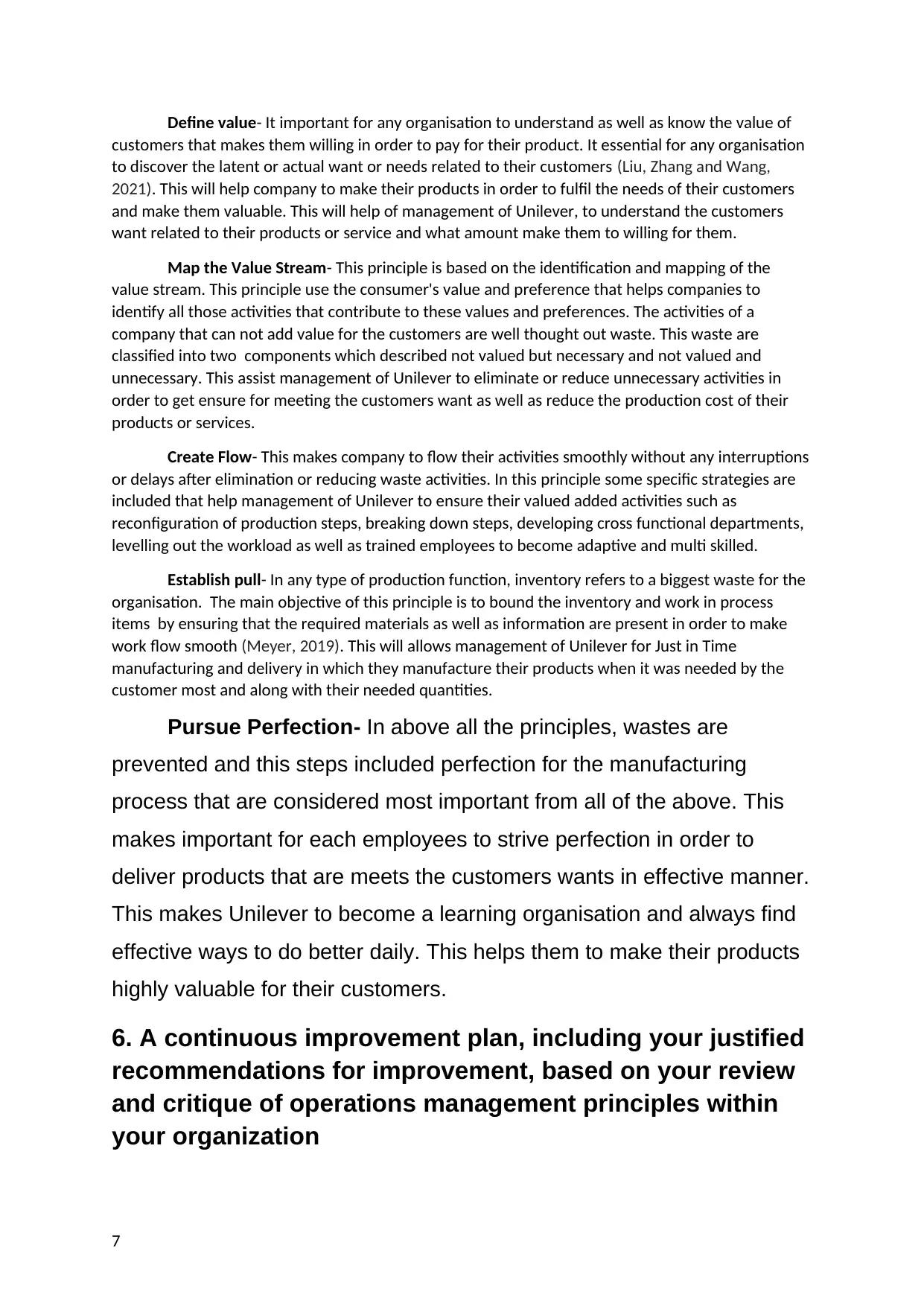
Define value- It important for any organisation to understand as well as know the value of
customers that makes them willing in order to pay for their product. It essential for any organisation
to discover the latent or actual want or needs related to their customers (Liu, Zhang and Wang,
2021). This will help company to make their products in order to fulfil the needs of their customers
and make them valuable. This will help of management of Unilever, to understand the customers
want related to their products or service and what amount make them to willing for them.
Map the Value Stream- This principle is based on the identification and mapping of the
value stream. This principle use the consumer's value and preference that helps companies to
identify all those activities that contribute to these values and preferences. The activities of a
company that can not add value for the customers are well thought out waste. This waste are
classified into two components which described not valued but necessary and not valued and
unnecessary. This assist management of Unilever to eliminate or reduce unnecessary activities in
order to get ensure for meeting the customers want as well as reduce the production cost of their
products or services.
Create Flow- This makes company to flow their activities smoothly without any interruptions
or delays after elimination or reducing waste activities. In this principle some specific strategies are
included that help management of Unilever to ensure their valued added activities such as
reconfiguration of production steps, breaking down steps, developing cross functional departments,
levelling out the workload as well as trained employees to become adaptive and multi skilled.
Establish pull- In any type of production function, inventory refers to a biggest waste for the
organisation. The main objective of this principle is to bound the inventory and work in process
items by ensuring that the required materials as well as information are present in order to make
work flow smooth (Meyer, 2019). This will allows management of Unilever for Just in Time
manufacturing and delivery in which they manufacture their products when it was needed by the
customer most and along with their needed quantities.
Pursue Perfection- In above all the principles, wastes are
prevented and this steps included perfection for the manufacturing
process that are considered most important from all of the above. This
makes important for each employees to strive perfection in order to
deliver products that are meets the customers wants in effective manner.
This makes Unilever to become a learning organisation and always find
effective ways to do better daily. This helps them to make their products
highly valuable for their customers.
6. A continuous improvement plan, including your justified
recommendations for improvement, based on your review
and critique of operations management principles within
your organization
7
customers that makes them willing in order to pay for their product. It essential for any organisation
to discover the latent or actual want or needs related to their customers (Liu, Zhang and Wang,
2021). This will help company to make their products in order to fulfil the needs of their customers
and make them valuable. This will help of management of Unilever, to understand the customers
want related to their products or service and what amount make them to willing for them.
Map the Value Stream- This principle is based on the identification and mapping of the
value stream. This principle use the consumer's value and preference that helps companies to
identify all those activities that contribute to these values and preferences. The activities of a
company that can not add value for the customers are well thought out waste. This waste are
classified into two components which described not valued but necessary and not valued and
unnecessary. This assist management of Unilever to eliminate or reduce unnecessary activities in
order to get ensure for meeting the customers want as well as reduce the production cost of their
products or services.
Create Flow- This makes company to flow their activities smoothly without any interruptions
or delays after elimination or reducing waste activities. In this principle some specific strategies are
included that help management of Unilever to ensure their valued added activities such as
reconfiguration of production steps, breaking down steps, developing cross functional departments,
levelling out the workload as well as trained employees to become adaptive and multi skilled.
Establish pull- In any type of production function, inventory refers to a biggest waste for the
organisation. The main objective of this principle is to bound the inventory and work in process
items by ensuring that the required materials as well as information are present in order to make
work flow smooth (Meyer, 2019). This will allows management of Unilever for Just in Time
manufacturing and delivery in which they manufacture their products when it was needed by the
customer most and along with their needed quantities.
Pursue Perfection- In above all the principles, wastes are
prevented and this steps included perfection for the manufacturing
process that are considered most important from all of the above. This
makes important for each employees to strive perfection in order to
deliver products that are meets the customers wants in effective manner.
This makes Unilever to become a learning organisation and always find
effective ways to do better daily. This helps them to make their products
highly valuable for their customers.
6. A continuous improvement plan, including your justified
recommendations for improvement, based on your review
and critique of operations management principles within
your organization
7
Paraphrase This Document
Need a fresh take? Get an instant paraphrase of this document with our AI Paraphraser
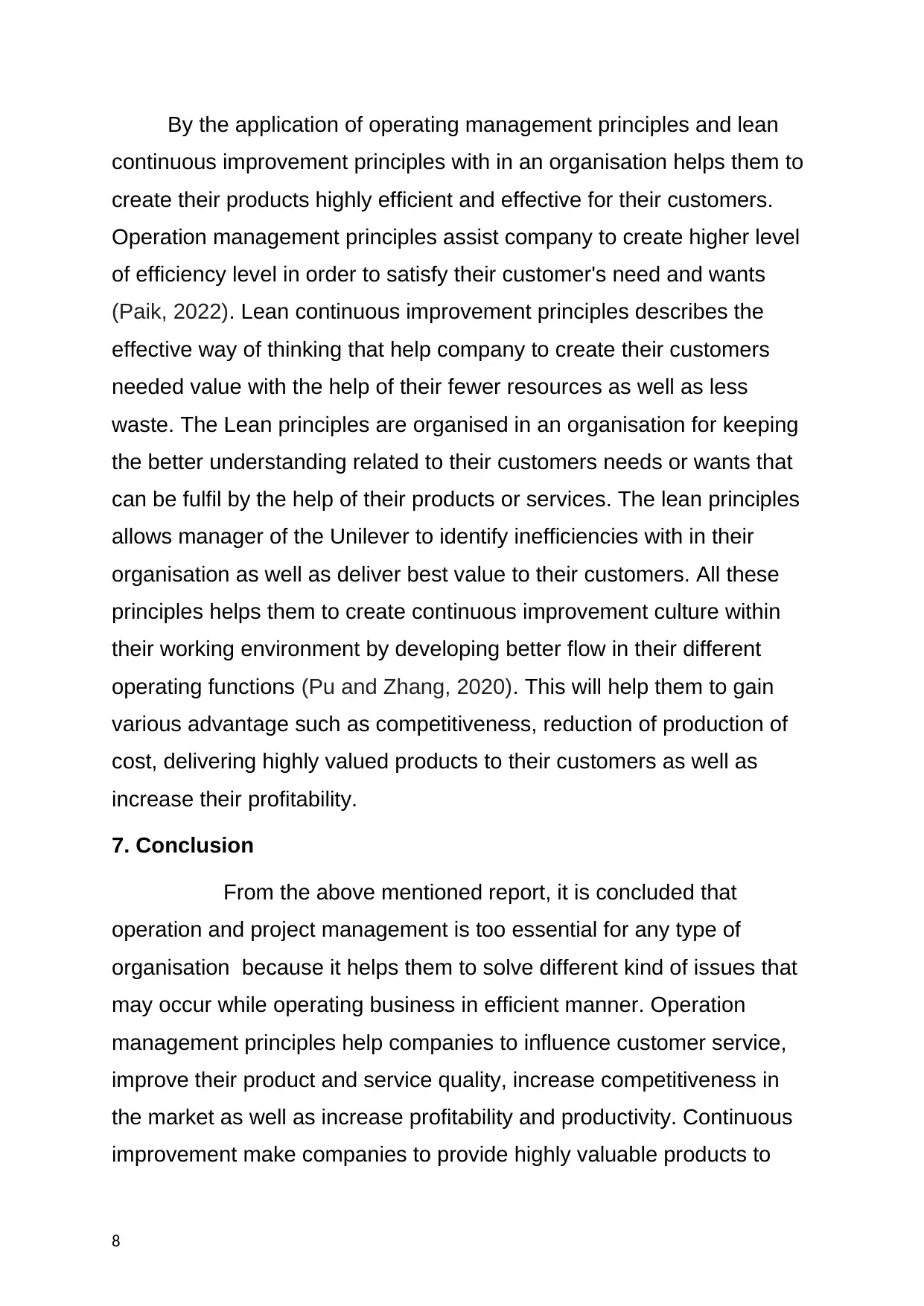
By the application of operating management principles and lean
continuous improvement principles with in an organisation helps them to
create their products highly efficient and effective for their customers.
Operation management principles assist company to create higher level
of efficiency level in order to satisfy their customer's need and wants
(Paik, 2022). Lean continuous improvement principles describes the
effective way of thinking that help company to create their customers
needed value with the help of their fewer resources as well as less
waste. The Lean principles are organised in an organisation for keeping
the better understanding related to their customers needs or wants that
can be fulfil by the help of their products or services. The lean principles
allows manager of the Unilever to identify inefficiencies with in their
organisation as well as deliver best value to their customers. All these
principles helps them to create continuous improvement culture within
their working environment by developing better flow in their different
operating functions (Pu and Zhang, 2020). This will help them to gain
various advantage such as competitiveness, reduction of production of
cost, delivering highly valued products to their customers as well as
increase their profitability.
7. Conclusion
From the above mentioned report, it is concluded that
operation and project management is too essential for any type of
organisation because it helps them to solve different kind of issues that
may occur while operating business in efficient manner. Operation
management principles help companies to influence customer service,
improve their product and service quality, increase competitiveness in
the market as well as increase profitability and productivity. Continuous
improvement make companies to provide highly valuable products to
8
continuous improvement principles with in an organisation helps them to
create their products highly efficient and effective for their customers.
Operation management principles assist company to create higher level
of efficiency level in order to satisfy their customer's need and wants
(Paik, 2022). Lean continuous improvement principles describes the
effective way of thinking that help company to create their customers
needed value with the help of their fewer resources as well as less
waste. The Lean principles are organised in an organisation for keeping
the better understanding related to their customers needs or wants that
can be fulfil by the help of their products or services. The lean principles
allows manager of the Unilever to identify inefficiencies with in their
organisation as well as deliver best value to their customers. All these
principles helps them to create continuous improvement culture within
their working environment by developing better flow in their different
operating functions (Pu and Zhang, 2020). This will help them to gain
various advantage such as competitiveness, reduction of production of
cost, delivering highly valued products to their customers as well as
increase their profitability.
7. Conclusion
From the above mentioned report, it is concluded that
operation and project management is too essential for any type of
organisation because it helps them to solve different kind of issues that
may occur while operating business in efficient manner. Operation
management principles help companies to influence customer service,
improve their product and service quality, increase competitiveness in
the market as well as increase profitability and productivity. Continuous
improvement make companies to provide highly valuable products to
8
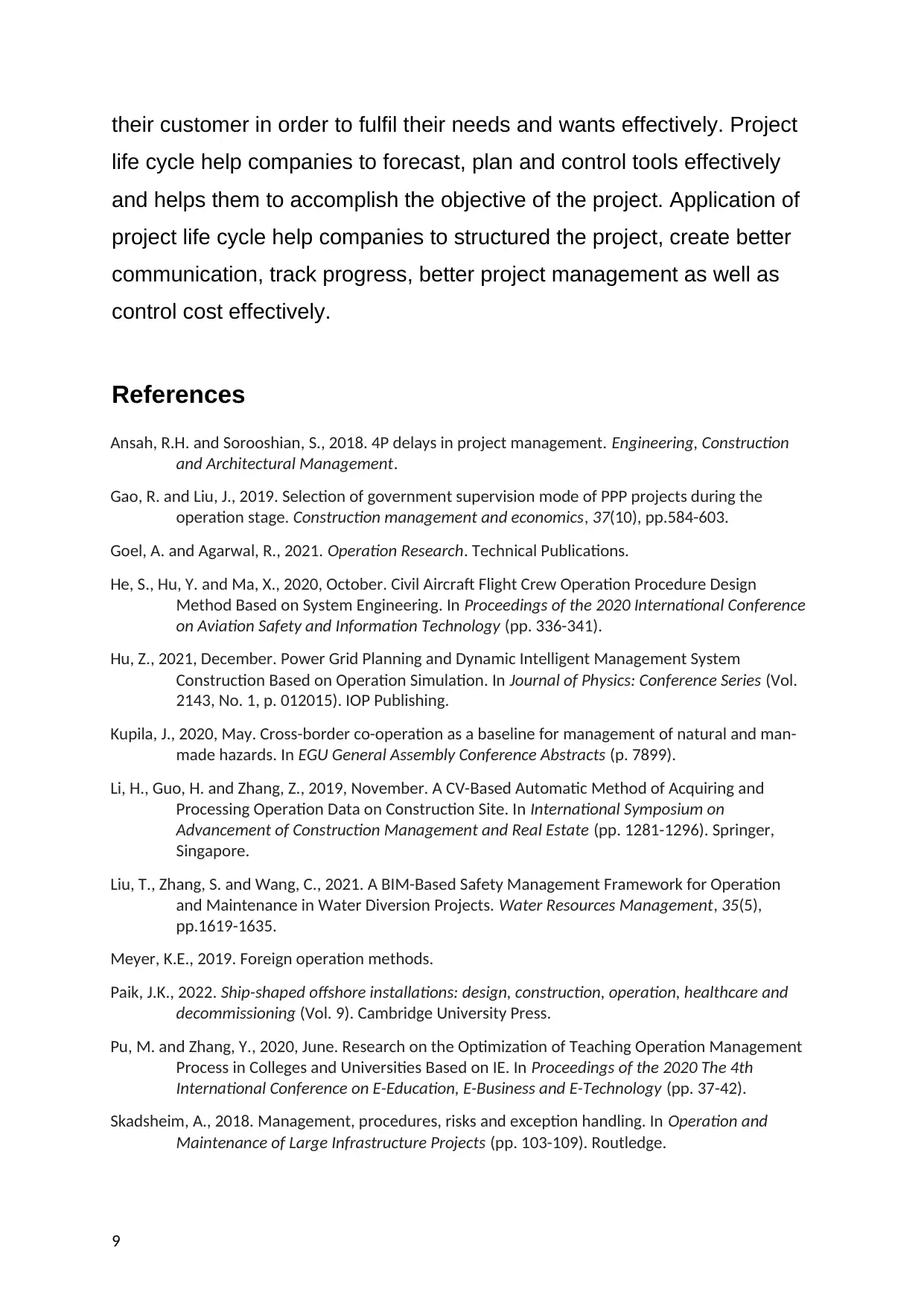
their customer in order to fulfil their needs and wants effectively. Project
life cycle help companies to forecast, plan and control tools effectively
and helps them to accomplish the objective of the project. Application of
project life cycle help companies to structured the project, create better
communication, track progress, better project management as well as
control cost effectively.
References
Ansah, R.H. and Sorooshian, S., 2018. 4P delays in project management. Engineering, Construction
and Architectural Management.
Gao, R. and Liu, J., 2019. Selection of government supervision mode of PPP projects during the
operation stage. Construction management and economics, 37(10), pp.584-603.
Goel, A. and Agarwal, R., 2021. Operation Research. Technical Publications.
He, S., Hu, Y. and Ma, X., 2020, October. Civil Aircraft Flight Crew Operation Procedure Design
Method Based on System Engineering. In Proceedings of the 2020 International Conference
on Aviation Safety and Information Technology (pp. 336-341).
Hu, Z., 2021, December. Power Grid Planning and Dynamic Intelligent Management System
Construction Based on Operation Simulation. In Journal of Physics: Conference Series (Vol.
2143, No. 1, p. 012015). IOP Publishing.
Kupila, J., 2020, May. Cross-border co-operation as a baseline for management of natural and man-
made hazards. In EGU General Assembly Conference Abstracts (p. 7899).
Li, H., Guo, H. and Zhang, Z., 2019, November. A CV-Based Automatic Method of Acquiring and
Processing Operation Data on Construction Site. In International Symposium on
Advancement of Construction Management and Real Estate (pp. 1281-1296). Springer,
Singapore.
Liu, T., Zhang, S. and Wang, C., 2021. A BIM-Based Safety Management Framework for Operation
and Maintenance in Water Diversion Projects. Water Resources Management, 35(5),
pp.1619-1635.
Meyer, K.E., 2019. Foreign operation methods.
Paik, J.K., 2022. Ship-shaped offshore installations: design, construction, operation, healthcare and
decommissioning (Vol. 9). Cambridge University Press.
Pu, M. and Zhang, Y., 2020, June. Research on the Optimization of Teaching Operation Management
Process in Colleges and Universities Based on IE. In Proceedings of the 2020 The 4th
International Conference on E-Education, E-Business and E-Technology (pp. 37-42).
Skadsheim, A., 2018. Management, procedures, risks and exception handling. In Operation and
Maintenance of Large Infrastructure Projects (pp. 103-109). Routledge.
9
life cycle help companies to forecast, plan and control tools effectively
and helps them to accomplish the objective of the project. Application of
project life cycle help companies to structured the project, create better
communication, track progress, better project management as well as
control cost effectively.
References
Ansah, R.H. and Sorooshian, S., 2018. 4P delays in project management. Engineering, Construction
and Architectural Management.
Gao, R. and Liu, J., 2019. Selection of government supervision mode of PPP projects during the
operation stage. Construction management and economics, 37(10), pp.584-603.
Goel, A. and Agarwal, R., 2021. Operation Research. Technical Publications.
He, S., Hu, Y. and Ma, X., 2020, October. Civil Aircraft Flight Crew Operation Procedure Design
Method Based on System Engineering. In Proceedings of the 2020 International Conference
on Aviation Safety and Information Technology (pp. 336-341).
Hu, Z., 2021, December. Power Grid Planning and Dynamic Intelligent Management System
Construction Based on Operation Simulation. In Journal of Physics: Conference Series (Vol.
2143, No. 1, p. 012015). IOP Publishing.
Kupila, J., 2020, May. Cross-border co-operation as a baseline for management of natural and man-
made hazards. In EGU General Assembly Conference Abstracts (p. 7899).
Li, H., Guo, H. and Zhang, Z., 2019, November. A CV-Based Automatic Method of Acquiring and
Processing Operation Data on Construction Site. In International Symposium on
Advancement of Construction Management and Real Estate (pp. 1281-1296). Springer,
Singapore.
Liu, T., Zhang, S. and Wang, C., 2021. A BIM-Based Safety Management Framework for Operation
and Maintenance in Water Diversion Projects. Water Resources Management, 35(5),
pp.1619-1635.
Meyer, K.E., 2019. Foreign operation methods.
Paik, J.K., 2022. Ship-shaped offshore installations: design, construction, operation, healthcare and
decommissioning (Vol. 9). Cambridge University Press.
Pu, M. and Zhang, Y., 2020, June. Research on the Optimization of Teaching Operation Management
Process in Colleges and Universities Based on IE. In Proceedings of the 2020 The 4th
International Conference on E-Education, E-Business and E-Technology (pp. 37-42).
Skadsheim, A., 2018. Management, procedures, risks and exception handling. In Operation and
Maintenance of Large Infrastructure Projects (pp. 103-109). Routledge.
9
⊘ This is a preview!⊘
Do you want full access?
Subscribe today to unlock all pages.

Trusted by 1+ million students worldwide
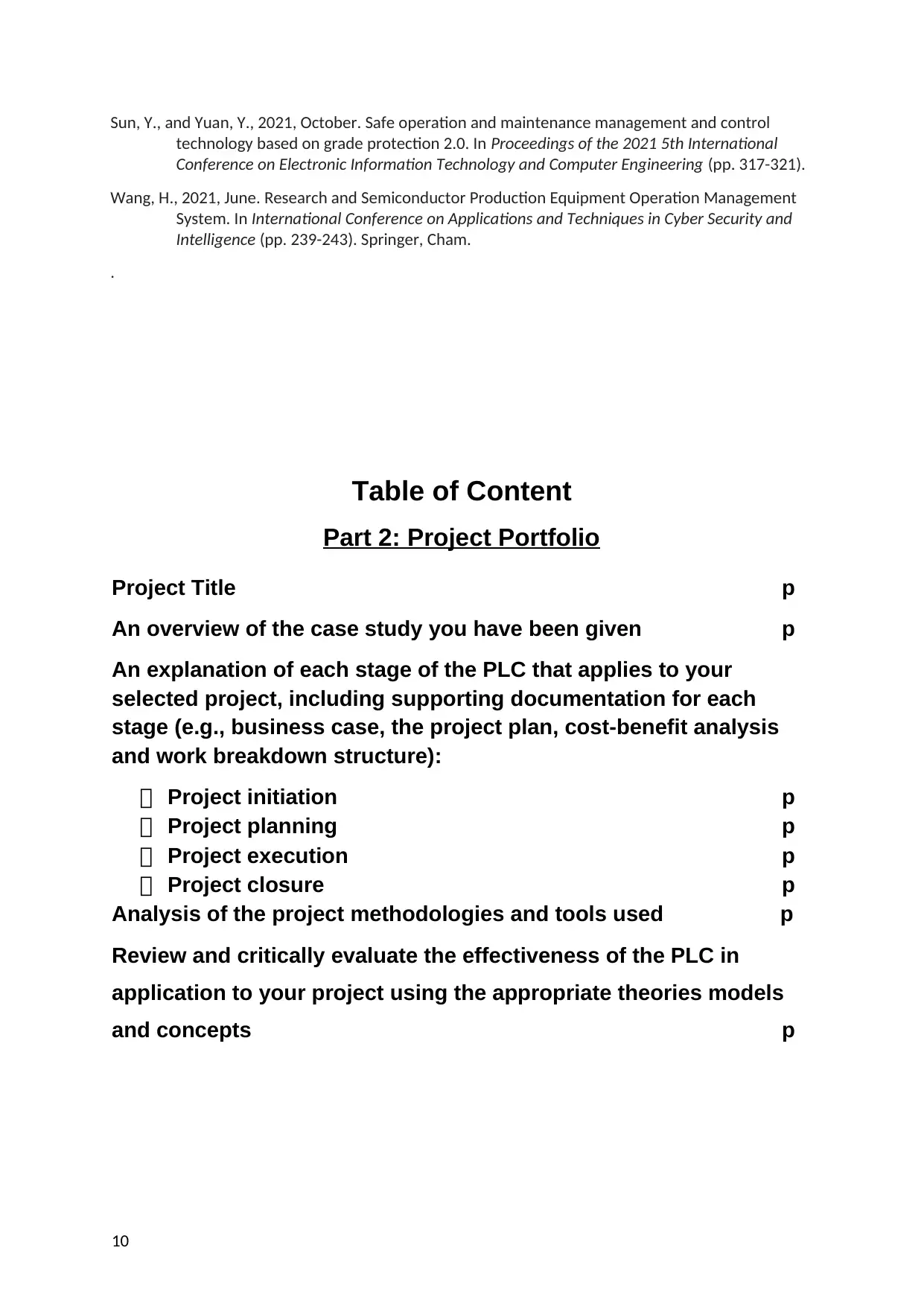
Sun, Y., and Yuan, Y., 2021, October. Safe operation and maintenance management and control
technology based on grade protection 2.0. In Proceedings of the 2021 5th International
Conference on Electronic Information Technology and Computer Engineering (pp. 317-321).
Wang, H., 2021, June. Research and Semiconductor Production Equipment Operation Management
System. In International Conference on Applications and Techniques in Cyber Security and
Intelligence (pp. 239-243). Springer, Cham.
.
Table of Content
Part 2: Project Portfolio
Project Title p
An overview of the case study you have been given p
An explanation of each stage of the PLC that applies to your
selected project, including supporting documentation for each
stage (e.g., business case, the project plan, cost-benefit analysis
and work breakdown structure):
Project initiation p
Project planning p
Project execution p
Project closure p
Analysis of the project methodologies and tools used p
Review and critically evaluate the effectiveness of the PLC in
application to your project using the appropriate theories models
and concepts p
10
technology based on grade protection 2.0. In Proceedings of the 2021 5th International
Conference on Electronic Information Technology and Computer Engineering (pp. 317-321).
Wang, H., 2021, June. Research and Semiconductor Production Equipment Operation Management
System. In International Conference on Applications and Techniques in Cyber Security and
Intelligence (pp. 239-243). Springer, Cham.
.
Table of Content
Part 2: Project Portfolio
Project Title p
An overview of the case study you have been given p
An explanation of each stage of the PLC that applies to your
selected project, including supporting documentation for each
stage (e.g., business case, the project plan, cost-benefit analysis
and work breakdown structure):
Project initiation p
Project planning p
Project execution p
Project closure p
Analysis of the project methodologies and tools used p
Review and critically evaluate the effectiveness of the PLC in
application to your project using the appropriate theories models
and concepts p
10
Paraphrase This Document
Need a fresh take? Get an instant paraphrase of this document with our AI Paraphraser
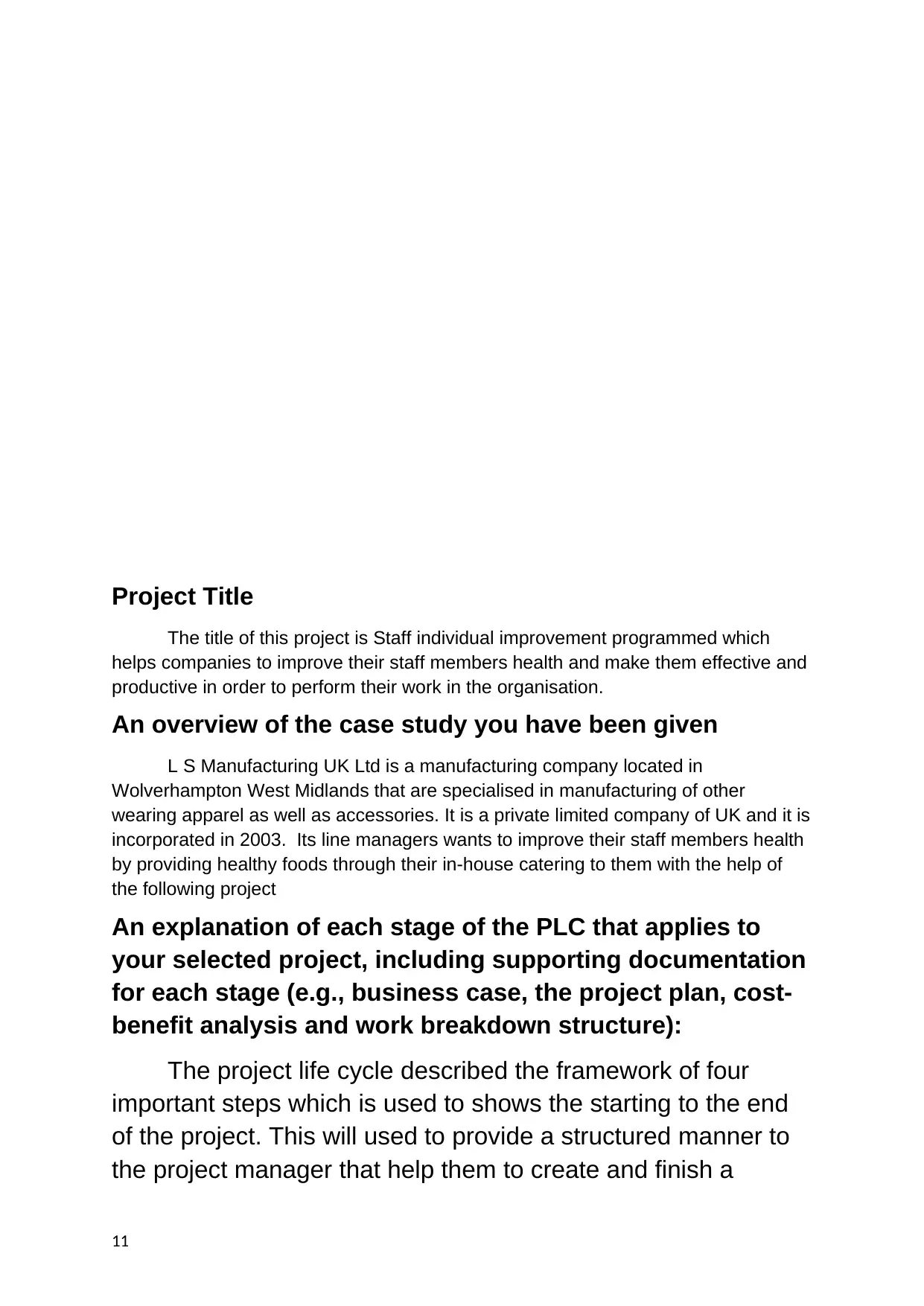
Project Title
The title of this project is Staff individual improvement programmed which
helps companies to improve their staff members health and make them effective and
productive in order to perform their work in the organisation.
An overview of the case study you have been given
L S Manufacturing UK Ltd is a manufacturing company located in
Wolverhampton West Midlands that are specialised in manufacturing of other
wearing apparel as well as accessories. It is a private limited company of UK and it is
incorporated in 2003. Its line managers wants to improve their staff members health
by providing healthy foods through their in-house catering to them with the help of
the following project
An explanation of each stage of the PLC that applies to
your selected project, including supporting documentation
for each stage (e.g., business case, the project plan, cost-
benefit analysis and work breakdown structure):
The project life cycle described the framework of four
important steps which is used to shows the starting to the end
of the project. This will used to provide a structured manner to
the project manager that help them to create and finish a
11
The title of this project is Staff individual improvement programmed which
helps companies to improve their staff members health and make them effective and
productive in order to perform their work in the organisation.
An overview of the case study you have been given
L S Manufacturing UK Ltd is a manufacturing company located in
Wolverhampton West Midlands that are specialised in manufacturing of other
wearing apparel as well as accessories. It is a private limited company of UK and it is
incorporated in 2003. Its line managers wants to improve their staff members health
by providing healthy foods through their in-house catering to them with the help of
the following project
An explanation of each stage of the PLC that applies to
your selected project, including supporting documentation
for each stage (e.g., business case, the project plan, cost-
benefit analysis and work breakdown structure):
The project life cycle described the framework of four
important steps which is used to shows the starting to the end
of the project. This will used to provide a structured manner to
the project manager that help them to create and finish a
11
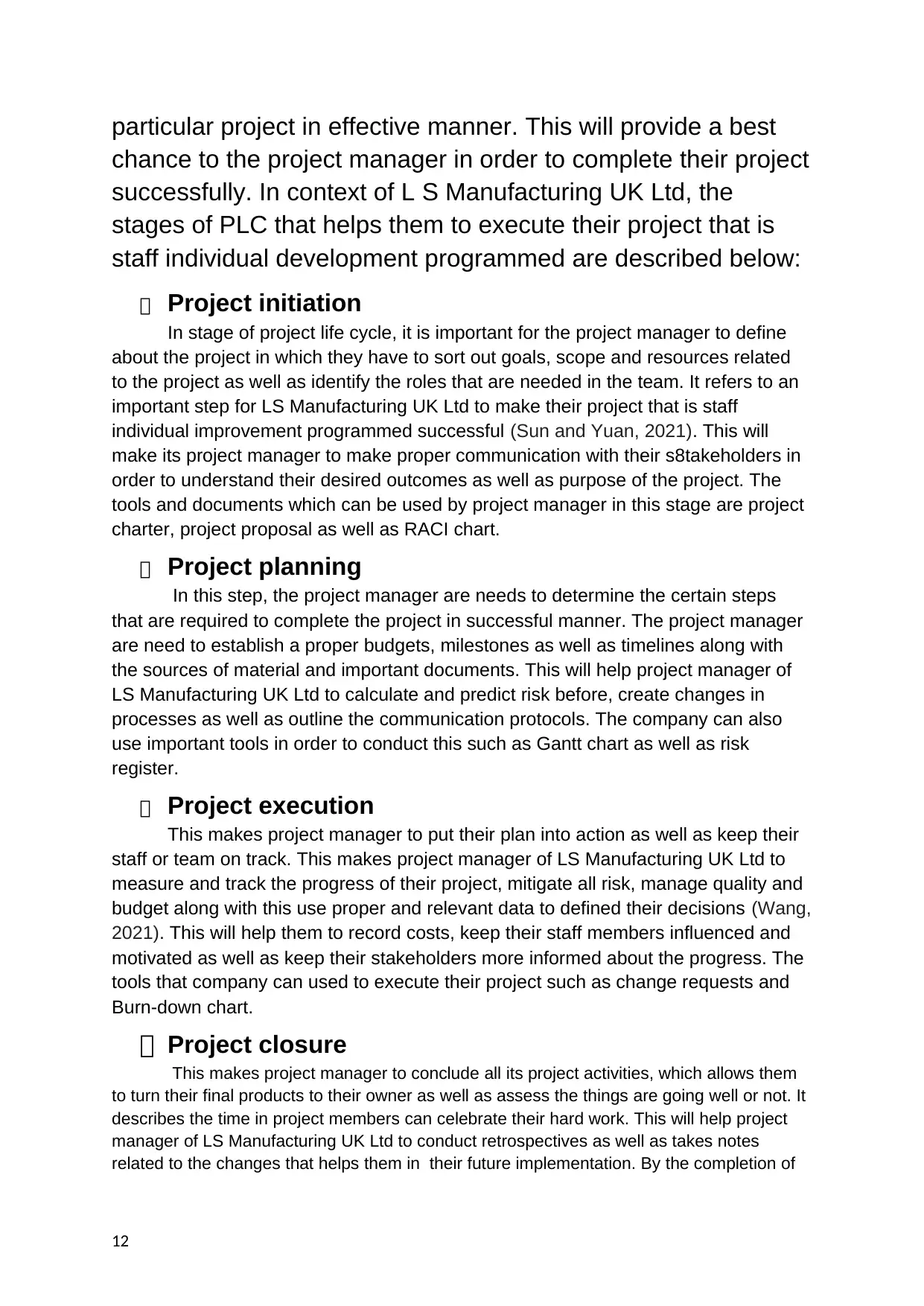
particular project in effective manner. This will provide a best
chance to the project manager in order to complete their project
successfully. In context of L S Manufacturing UK Ltd, the
stages of PLC that helps them to execute their project that is
staff individual development programmed are described below:
Project initiation
In stage of project life cycle, it is important for the project manager to define
about the project in which they have to sort out goals, scope and resources related
to the project as well as identify the roles that are needed in the team. It refers to an
important step for LS Manufacturing UK Ltd to make their project that is staff
individual improvement programmed successful (Sun and Yuan, 2021). This will
make its project manager to make proper communication with their s8takeholders in
order to understand their desired outcomes as well as purpose of the project. The
tools and documents which can be used by project manager in this stage are project
charter, project proposal as well as RACI chart.
Project planning
In this step, the project manager are needs to determine the certain steps
that are required to complete the project in successful manner. The project manager
are need to establish a proper budgets, milestones as well as timelines along with
the sources of material and important documents. This will help project manager of
LS Manufacturing UK Ltd to calculate and predict risk before, create changes in
processes as well as outline the communication protocols. The company can also
use important tools in order to conduct this such as Gantt chart as well as risk
register.
Project execution
This makes project manager to put their plan into action as well as keep their
staff or team on track. This makes project manager of LS Manufacturing UK Ltd to
measure and track the progress of their project, mitigate all risk, manage quality and
budget along with this use proper and relevant data to defined their decisions (Wang,
2021). This will help them to record costs, keep their staff members influenced and
motivated as well as keep their stakeholders more informed about the progress. The
tools that company can used to execute their project such as change requests and
Burn-down chart.
Project closure
This makes project manager to conclude all its project activities, which allows them
to turn their final products to their owner as well as assess the things are going well or not. It
describes the time in project members can celebrate their hard work. This will help project
manager of LS Manufacturing UK Ltd to conduct retrospectives as well as takes notes
related to the changes that helps them in their future implementation. By the completion of
12
chance to the project manager in order to complete their project
successfully. In context of L S Manufacturing UK Ltd, the
stages of PLC that helps them to execute their project that is
staff individual development programmed are described below:
Project initiation
In stage of project life cycle, it is important for the project manager to define
about the project in which they have to sort out goals, scope and resources related
to the project as well as identify the roles that are needed in the team. It refers to an
important step for LS Manufacturing UK Ltd to make their project that is staff
individual improvement programmed successful (Sun and Yuan, 2021). This will
make its project manager to make proper communication with their s8takeholders in
order to understand their desired outcomes as well as purpose of the project. The
tools and documents which can be used by project manager in this stage are project
charter, project proposal as well as RACI chart.
Project planning
In this step, the project manager are needs to determine the certain steps
that are required to complete the project in successful manner. The project manager
are need to establish a proper budgets, milestones as well as timelines along with
the sources of material and important documents. This will help project manager of
LS Manufacturing UK Ltd to calculate and predict risk before, create changes in
processes as well as outline the communication protocols. The company can also
use important tools in order to conduct this such as Gantt chart as well as risk
register.
Project execution
This makes project manager to put their plan into action as well as keep their
staff or team on track. This makes project manager of LS Manufacturing UK Ltd to
measure and track the progress of their project, mitigate all risk, manage quality and
budget along with this use proper and relevant data to defined their decisions (Wang,
2021). This will help them to record costs, keep their staff members influenced and
motivated as well as keep their stakeholders more informed about the progress. The
tools that company can used to execute their project such as change requests and
Burn-down chart.
Project closure
This makes project manager to conclude all its project activities, which allows them
to turn their final products to their owner as well as assess the things are going well or not. It
describes the time in project members can celebrate their hard work. This will help project
manager of LS Manufacturing UK Ltd to conduct retrospectives as well as takes notes
related to the changes that helps them in their future implementation. By the completion of
12
⊘ This is a preview!⊘
Do you want full access?
Subscribe today to unlock all pages.

Trusted by 1+ million students worldwide
1 out of 16
Related Documents
Your All-in-One AI-Powered Toolkit for Academic Success.
+13062052269
info@desklib.com
Available 24*7 on WhatsApp / Email
![[object Object]](/_next/static/media/star-bottom.7253800d.svg)
Unlock your academic potential
Copyright © 2020–2026 A2Z Services. All Rights Reserved. Developed and managed by ZUCOL.
